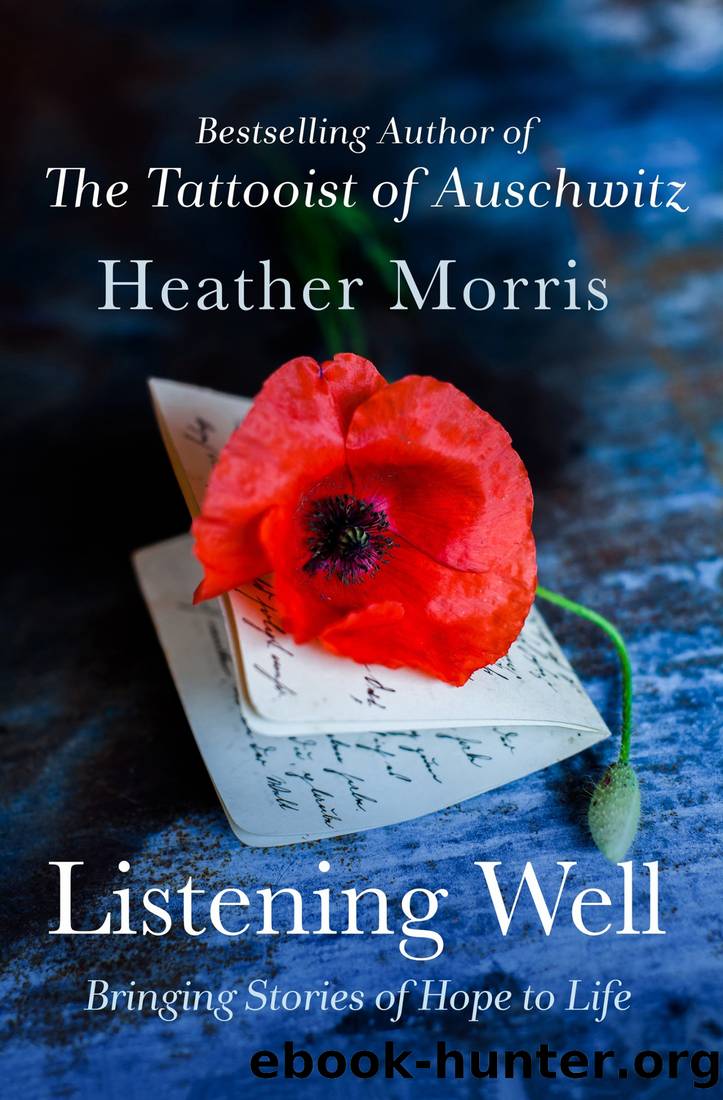Listening Well: Bringing Stories of Hope to Life by Heather Morris

Author:Heather Morris [Morris, Heather]
Language: eng
Format: epub
Tags: Biography & Autobiography, Personal Memoirs, Language Arts & Disciplines, Writing, Nonfiction (Incl. Memoirs)
ISBN: 9781250276926
Google: PrA9EAAAQBAJ
Publisher: St.Martin's
Published: 2022-08-02T20:38:44+00:00
Asking the Right Question
Iâm often asked, how does the listener know what is the right question at the right moment, what do people want to be asked, or what question will unlock a story? How do we sense what is a gentle prompt, an indicator that weâre prepared to listen, and what might instead be intrusive?
When I consider these questions, I always hear the words Lale said to me when we first met. He asked the question, âDid you know I was the Tätowierer?â I had to say no on two counts. I had just met him, and I did not know what his story was, and I had no idea what a Tätowierer was. He replied, âWell, I was, I was the person making the numbers on the arms at Auschwitz-Birkenau.â He pulled up his shirt sleeve and placed his left arm inches from my face. I kept my expression neutral as my eyes followed the fading green numbers he was pointing to: 32407. I now knew what a Tätowierer was.
I knew the key to learning Laleâs story was to listen, not interrupt. The few times I asked a question midsentence, he would get cranky, lose his way in the story he was telling, and struggle to reconnect. Instead, I had to work with his broken story lines, fired at me often at bullet pace, with limited or no connection from one to the other. As you can imagine, with so many disjointed facts, emotional and clinical, there had to come a time when I needed to ask questions, get clarificationâa deeper understanding of what he had witnessed and experienced.
The day Lale said, âHave I told you about Cilka?â has become a watershed moment for me. When I said, âNo, who was she?â he responded with the simple statement: âShe was the bravest person,â wagging his finger, ânot the bravest girl, the bravest person I ever met.â He then became distressed and wouldnât talk anymore about her other than to say, âWe couldnât save her.â
I let the conversation end there, knowing I would come back to Cilka when I felt the time was right. In fact, it would take several months for me to get any details about her and her role in Birkenau because Lale would always become distraught when he recounted what she had endured there and during her subsequent imprisonment in a Siberian Gulag.
On one visit with his friend Tuli, Lale mentioned that Tuli and Cilka had come from the same town, Bardejov. I immediately asked Tuli what he remembered about her. He told me he knew her in their hometown, knew what she was doing in Birkenau, and felt sorry for her. He was the first person who said to me that Cilka did âbadâ things. When pressed, he said he only heard what she was doing. She was, however, kind to him and took a risk to get him warm clothing and a blanket the first winter when he nearly died from the cold. He credits her with saving his life.
Download
This site does not store any files on its server. We only index and link to content provided by other sites. Please contact the content providers to delete copyright contents if any and email us, we'll remove relevant links or contents immediately.
| Publishing & Books | Research |
| Writing |
Asking the Right Questions: A Guide to Critical Thinking by M. Neil Browne & Stuart M. Keeley(5764)
Autoboyography by Christina Lauren(5228)
Eat That Frog! by Brian Tracy(4526)
Dialogue by Robert McKee(4389)
Sticky Fingers by Joe Hagan(4189)
Journeys Out of the Body by Robert Monroe(3619)
Annapurna by Maurice Herzog(3464)
Full Circle by Michael Palin(3443)
Schaum's Quick Guide to Writing Great Short Stories by Margaret Lucke(3376)
Elements of Style 2017 by Richard De A'Morelli(3343)
The Art of Dramatic Writing: Its Basis in the Creative Interpretation of Human Motives by Egri Lajos(3063)
Atlas Obscura by Joshua Foer(2955)
Why I Write by George Orwell(2945)
The Fight by Norman Mailer(2930)
The Diviners by Libba Bray(2927)
In Patagonia by Bruce Chatwin(2922)
The Mental Game of Writing: How to Overcome Obstacles, Stay Creative and Productive, and Free Your Mind for Success by James Scott Bell(2904)
Venice by Jan Morris(2570)
The Elements of Style by William Strunk and E. B. White(2470)
